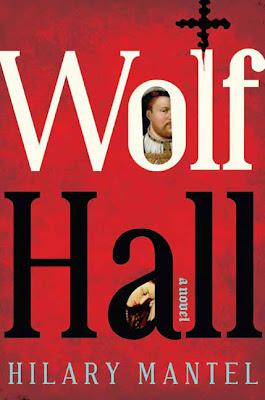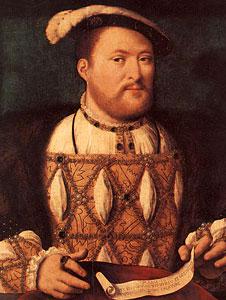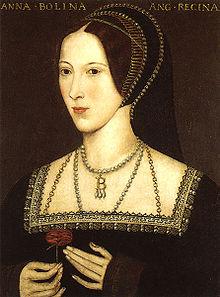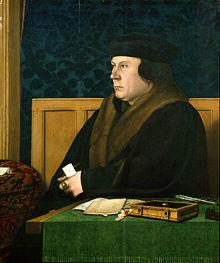 (from the blurb) "Lock Cromwell in a deep dungeon in the morning," says Thomas More, "and when you come back that night he'll be sitting on a plush cushion eating larks' tongues, and all the gaolers will owe him money."
(from the blurb) "Lock Cromwell in a deep dungeon in the morning," says Thomas More, "and when you come back that night he'll be sitting on a plush cushion eating larks' tongues, and all the gaolers will owe him money."
England, the 1520s. Henry VIII is on the throne, but has no heir. Cardinal Wolsey is his chief advisor, charged with securing the divorce the Pope refuses to grant. Into this atmosphere of distrust and need comes Thomas Cromwell, first as Wolsey's clerk, and later his successor. Cromwell is a wholly original man: the son of a brutal blacksmith, a political genius, a briber, a charmer, a bully, a man with a delicate and deadly expertise in manipulating people and events. Ruthless in pursuit of his own interests, he is as ambitious in his wider politics as he is for himself. His reforming agenda is carried out in the grip of a self-interested parliament and a king who fluctuates between romantic passions and murderous rages.
My musings
Thomas Cromwell was a man capable of writing a contract and taming a wild falcon, of drawing a map and settle a fight down, of furnishing a house and bribing a jury. He was the Machiavellian architect of Henry VIII's kingdom and master of the Tudors' destiny.

Henry VIII
He is the protagonist Hilary Mantel's Wolf Hall (the title refers to the name the residence of the Seymours) and from his point of view we witness the well-known facts: Cromwell was the man King Henry VIII trusted to get to marry Anne Boleyn and get rid of Catherine of Aragon. We watch and take part in all the whims of king and mistress from the smart, detached, strategic point of view of a power-hungry man. Cromwell is the emblem of a self - made man who thanks only to his incredible intellectual skills rose from very humble origins to be the politician who marked the new course of the English Church which led to the separation from the Church of Rome and from papal authority, the dissolution of the monasteries, and to the establishing of the king as the Supreme Head of the Church of England.Honestly, what still disturbs me is that all that was for ... a woman. Not for the love of a woman but in order to accomplish lusty wishes, which drove many others of Henry VIII's political decisions even later on. Mind you, I'm not a Puritan nor such a conservative but yet the fact disturbs me quite a lot.

Anne Boleyn
I usually try to read any book with great respect and rarely leave my task uncompleted, even when I don't like it. It may happen though that I can greatly appreciate works of almost unknown indie writers and be deeply disappointed by best selling authors and their pluriawarded works. It's not a rule, but it has happened more than once. You know, "beauty is in the eye of the beholder", hence completely subjective. This is why I had to rationallyrecognize the value of this well- crafted historical novel giving a new perspective on well-known facts but I couldn't be involved in the narration of those events nor sympathize or care for any of the characters. It was a totally unemotional reading: me following the events I already knew and leafing through the pages with very little curiosity or interest in what was going to happen.I usually read and love historical fiction to see the humanity behind history, while reading this novel was more or less as exciting as reading Antonia Fraser's remarkable essay, The Six Wives of Henry VIII. Can all this be due to my very little sympathy for Henry VIII?
However, to get to a conclusion, I must recognize that Henry VIII's age was a time were only unscrupled people could survive and only until they were in disfavour with the king, a tough period to live in and Hilary Mantel describes it with precision and historical accuracy. She describes the rise of Anne Boleyn's star as parallel to Thomas Cromwell's. And that's a totally new take on those events. The story ends almost abruptly on the day of Thomas More's execution. But we know the it goes on. There's a sequel coming out soon. Cromwell - The Historical figure (from BBC History)
Thomas Cromwell
Thomas Cromwell was an English statesman and adviser to Henry VIII, responsible for drafting the legislation that formalised England's break with Rome. He was born in Putney in southwest London in around 1485, the son of a cloth worker. He spent much of his early adulthood in Europe as a soldier, accountant and merchant, but returned to England around 1512 and studied law. In 1520, in a pivotal career move, he became legal secretary for Cardinal Wolsey who was in service to Henry VIII. When Wolsey fell out of favour with the king, Cromwell survived and in 1523 he became a member of parliament. Cromwell earned the king's confidences and rose swiftly. By 1532 he was the king's chief minister. He was a leading figure amongst those who suggested Henry make himself head of the English church. Cromwell presided over the dissolution of the monasteries with great efficiency and as a reward was created earl of Essex in 1540. Cromwell was deeply unpopular in England. In 1536, Catholics in the north of England rebelled in a series of uprisings known as the Pilgrimage of Grace and one of the targets of their anger was Thomas Cromwell. In 1540, Cromwell persuaded Henry VIII to agree to marry Anne of Cleves, in the hope of securing the support of the north German princes against the Holy Roman Emperor. The marriage was a disaster and the alliance failed. Henry withdrew his support from Cromwell, who was charged with treason. He was executed at the Tower of London on 28 July 1540.

